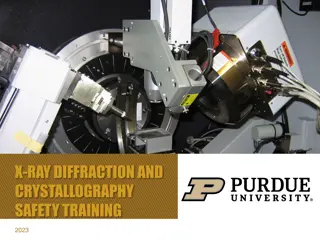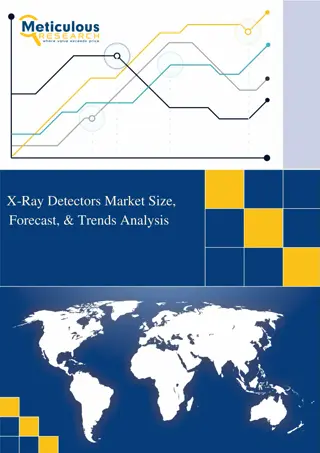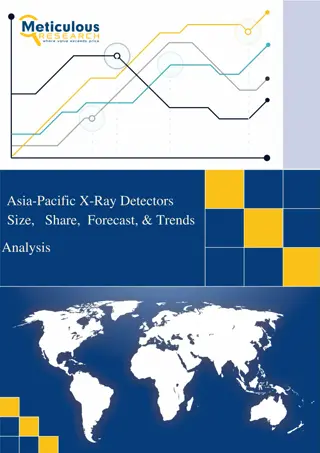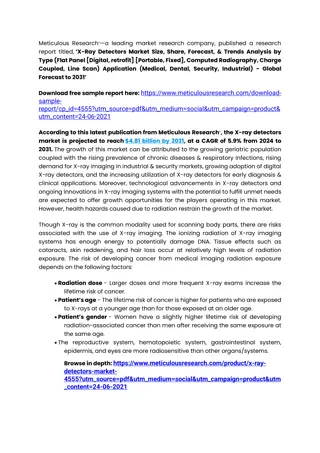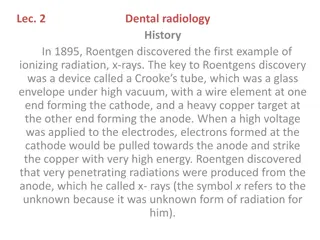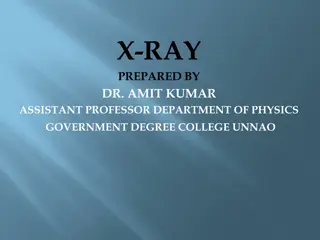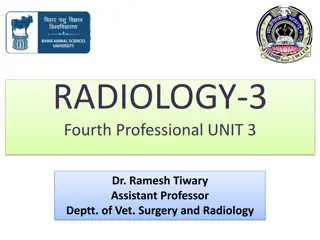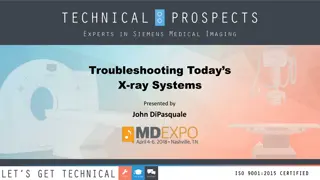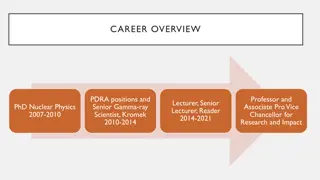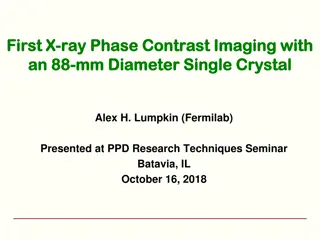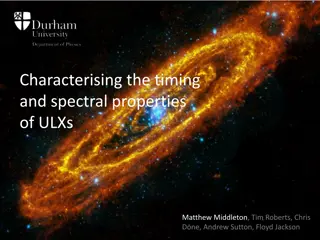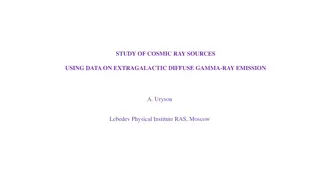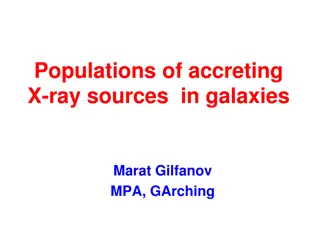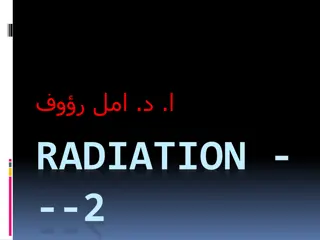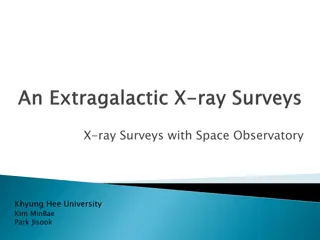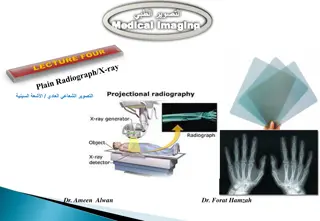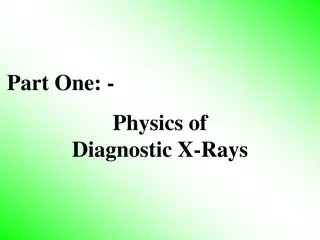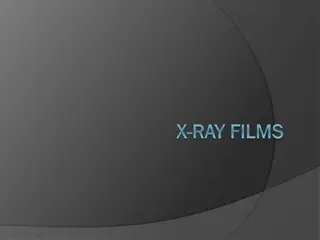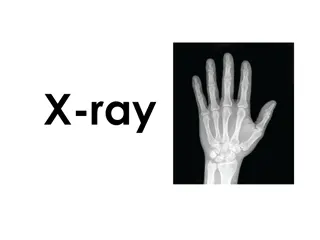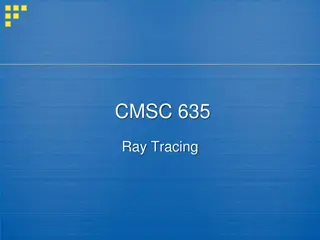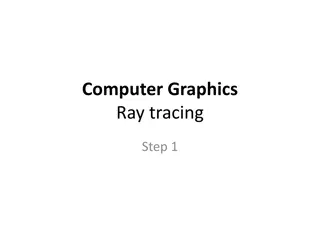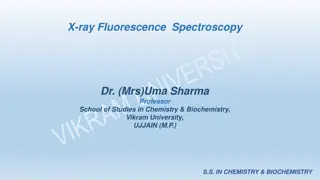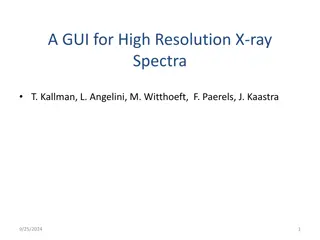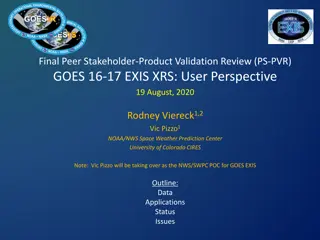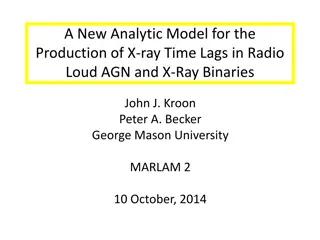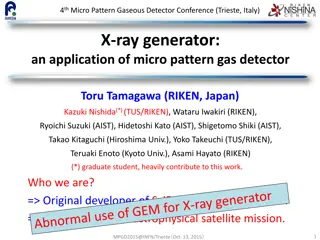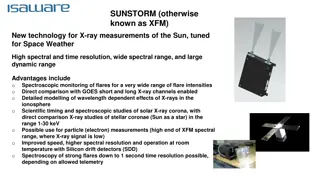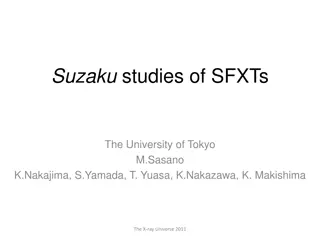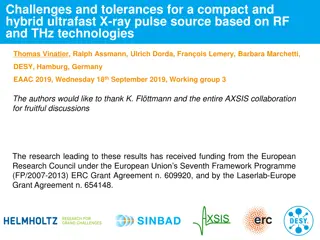X-ray Diffraction and Crystallography Safety Training Overview
X-ray diffraction and crystallography involve the use of ionizing electromagnetic radiation, specifically X-rays, which pose health risks if not handled properly. This training covers principles of X-ray safety, the importance of shielding materials like lead, steel, and concrete, X-ray production m
3 views • 44 slides
Understanding the Components of an X-Ray Machine
An X-ray machine consists of vital components like the x-ray tube, power supply, cathode, and anode. The x-ray tube houses the cathode and anode, which are responsible for generating x-rays. The cathode includes a filament heated to emit electrons, while the anode has a target to convert electron en
5 views • 22 slides
X-Ray Detectors Market
The growth of this market can be attributed to several factors, including the growing geriatric population coupled with the rising prevalence of chronic diseases & respiratory infections, rising demand for X-ray imaging in industrial & security markets, growing adoption of digital X-ray detectors
0 views • 3 slides
asia pacific x ray detecter
X-ray detectors are devices or systems used to capture and record X-ray images for medical, industrial, scientific, or security purposes. They are essential tools for visualizing the internal structures of objects and organisms through the use of X-ray radiation. X-ray detectors are used in a variet
1 views • 3 slides
xray detecter
X-ray detectors are devices or systems used to capture and record X-ray images for medical, industrial, scientific, or security purposes. They are essential tools for visualizing the internal structures of objects and organisms through the use of X-ray radiation. X-ray detectors are used in a variet
1 views • 2 slides
Evolution of Dental Radiology: From Roentgen's Discovery to Modern X-ray Machines
In 1895, Roentgen discovered x-rays using a Crooke's tube, marking the beginning of dental radiology. This technology evolved over time, leading to the development of modern dental x-ray machines with control panels and specialized parts like the tube head and extension arm. The components such as t
0 views • 34 slides
Understanding X-Ray Radiation: A Comprehensive Overview
X-ray radiation, discovered by Wilhelm Conrad Roentgen in 1895, is a high-energy electromagnetic radiation with a frequency range of 3.10^16Hz to 3.10^19Hz and a corresponding wavelength range from 0.01nm to 10nm. This form of radiation has applications in various fields, and its properties make it
0 views • 15 slides
Understanding X-Ray Production and Interactions in Radiology
Explore the fundamentals of X-ray production, including the types of ionizing radiation and interactions of photons with matter. Learn about the photoelectric effect, Compton effect, and characteristics of X-ray tubes, essential for radiology professionals and students. Delve into the mechanisms beh
0 views • 17 slides
Troubleshooting Today's X-ray Systems by John DiPasquale
Gain insights into troubleshooting modern X-ray systems with a comprehensive guide presented by John DiPasquale. Explore X-ray system subsystems, including generator systems and imaging systems, with detailed explanations and visuals. Learn about the basics of generator systems, required circuits, a
1 views • 33 slides
Understanding Soft Gamma-Ray Emissions from Pulsar Polar Caps
Soft gamma-ray emissions from the polar cap cascade region are a subject of interest in astrophysics, with studies focusing on the fundamental physical processes of pulsars and potential origins of non-thermal X-ray emissions. Researchers explore the emission processes, polar cap accelerators, casca
0 views • 16 slides
Accomplished Career in Nuclear Physics and Gamma-ray Spectroscopy
Experienced professional with a diverse background in nuclear physics and gamma-ray spectroscopy. Successfully held positions including Senior Gamma-ray Scientist, Professor, Associate Pro Vice Chancellor, and more. Achieved significant milestones such as securing research funding, supervising PhD s
1 views • 4 slides
Advances in X-ray Phase Contrast Imaging with Single Crystal Scintillators
This presentation discusses the use of single-crystal scintillators in X-ray imaging systems to optimize spatial resolution and efficiency. By utilizing modified FO plates and single crystals, a new paradigm has been introduced to enhance the point-spread function while maintaining or improving effi
0 views • 43 slides
Understanding Ultraluminous X-ray Sources (ULXs) Properties
Explore the timing and spectral properties of Ultraluminous X-ray Sources (ULXs) through research conducted by Middleton, Gladstone, Roberts, Done, Uttley, and others. Learn about the spectral shapes, spectral deconvolutions, variability in X-ray spectra, timing tools, classification into low and hi
0 views • 23 slides
X-Ray Equipment Operators Refresher Training Program Overview
This course provides a comprehensive refresher training for X-ray equipment operators, covering topics such as radiation science fundamentals, X-ray imaging review, safety plans, documentation, regulations, and more. The training emphasizes the importance of justification and optimization of imaging
0 views • 105 slides
Linking Soft-Ray Pulsar and Fermi LAT Pulsar Populations
This research presentation explores the connection between the soft-ray pulsar population and the Fermi LAT pulsar population, focusing on observational data and methodologies for increasing the sample size to enhance our understanding of high-energy pulsars. The study outlines the identification pr
0 views • 13 slides
Exploring Cosmic Ray Sources Using Gamma-Ray Emission Data
This study focuses on investigating ultrahigh energy cosmic ray (UHECR) sources by analyzing extragalactic diffuse gamma-ray emission data. Techniques such as examining UHECR mass composition and arrival directions, as well as studying interactions with cosmic microwave and extragalactic background
0 views • 16 slides
Overview of Observational Techniques and Student Talks in Astronomy
This content covers observational techniques, student talks, and dates related to various astronomical topics such as gamma-ray astronomy, basics of gamma-ray interaction, scintillators and solid-state detectors, Compton telescopes, and pair telescopes. It provides insights into the main processes i
0 views • 23 slides
Exploring X-Ray Emission from Galaxies by Marat Gilfanov
In this collection of images and discussions from the XMM Workshop 2010, Marat Gilfanov and collaborators delve into the study of X-ray emissions from galaxies. They investigate the properties of galaxies, stellar mass correlations, and the formation and evolution of X-ray binaries. The presentation
0 views • 35 slides
Understanding X-Ray Filtration and Collimation in Dentistry
X-ray filtration and collimation play crucial roles in dentistry to enhance diagnostic radiology. Filtration removes long wave lengths, ensuring a beam consisting of high-energy, penetrating short wave lengths. Collimation controls the size and shape of the x-ray beam, reducing patient exposure and
0 views • 21 slides
Exploring the Universe: X-Ray Surveys with Space Observatory
Delve into the fascinating world of X-ray surveys conducted by the Space Observatory at Khyung Hee University. Learn about the significance of X-ray surveys in detecting emission from hot regions of the Universe, minimizing errors in redshift measurements, extending the sample to higher redshifts, a
0 views • 16 slides
Riccardo Giacconi's Impact on Japanese X-ray Astronomy
Riccardo Giacconi played a significant role in Japanese X-ray astronomy, influencing the first generation of X-ray astronomers in Japan and contributing to the development of X-ray telescopes. His visits and collaborations with Japanese scientists, such as Hideyo Kunieda and Yasuo Tanaka, were instr
0 views • 8 slides
Understanding Ray Tracing in Computer Graphics
In the world of computer graphics, ray tracing plays a crucial role in rendering realistic images by simulating the behavior of light rays in a scene. This involves determining visibility, casting rays from a viewpoint, implementing ray tracing algorithms, computing viewing rays, calculating interse
0 views • 20 slides
Understanding Plain Radiograph/X-ray in Medical Imaging
Plain radiograph/X-ray is a fundamental tool in medical imaging that utilizes X-rays to create images of the human body. It provides fast, high-resolution, low-cost images without requiring special patient preparation. Components include the X-ray tube, detector, anti-scatter grid, couch, Bucky tabl
0 views • 10 slides
Introduction to the Physics of Diagnostic X-Rays
The discovery of X-rays by W.C. Roentgen in 1895 was accidental, leading to a groundbreaking advancement in the field of radiology. X-ray photons are part of the electromagnetic spectrum and have applications in diagnostic radiology, radiation therapy, and nuclear medicine. The production of X-ray b
0 views • 30 slides
Understanding X-Ray Films: Composition and Classification
This detailed content explores X-ray films, covering elements such as emulsion, base foundation, supercoat, and protective layers. Learn about the intricate composition of X-ray film packets, the role of lead foil and black wrappers, and the classification of intraoral and extraoral X-rays like IOPA
0 views • 24 slides
Exploring X-ray Imaging Technology in Healthcare
Delve into the world of X-ray technology through captivating images showcasing X-ray machines, procedures, and the importance of getting an X-ray. Uncover the intricacies of this vital medical imaging tool and its role in diagnosing various conditions.
0 views • 6 slides
Understanding Ray Tracing Techniques in Computer Graphics
Explore the fundamentals of ray tracing, including concepts like intersections, speedups, fewer intersections strategies, object bounding hierarchies, and space partitioning methods for efficient rendering. Learn about bounding spheres, AABBs, OBBs, K-DOPs, uniform grids, BSP trees, and octrees in t
0 views • 30 slides
Introduction to Computer Graphics Ray Tracing: Step 1
This content introduces the basics of computer graphics ray tracing through steps involving primary rays, spheres, point lights, diffuse shading, and the PPM format. It includes code snippets for generating PPM images and classes like Vec3 and Ray in C++.
0 views • 24 slides
Applications and Importance of X-ray Fluorescence Spectroscopy in Analytical Chemistry
X-ray Fluorescence Spectroscopy (XRF) is a vital analytical technique used for qualitative and quantitative analysis of elements based on their X-ray emission characteristics. Dr. Uma Sharma, a Professor at Vikram University, details various X-ray analytical methods, including X-ray emission, Auger
0 views • 21 slides
Understanding Ray Tracing Techniques in Computer Graphics
Explore the fundamentals of ray tracing including recursive ray casting, ray casting vs. ray tracing, basic algorithms, shadows, reflections, refractions, and advanced illumination models like Whitted model and OpenGL's illumination model. Learn about casting rays from the eye, handling reflections
0 views • 50 slides
Developing a Graphical User Interface for High-Resolution X-ray Spectra Analysis
High-resolution X-ray spectra analysis can be challenging due to the complex nature of the information contained within. This project aims to simplify the process by developing a user-friendly graphical interface that enables users to visualize, analyze, and interpret X-ray spectra data effectively.
0 views • 19 slides
Review of GOES 16-17 X-Ray Sensor Data and Applications
Peer Stakeholder Product Validation Review of the GOES 16-17 X-Ray Sensor (XRS) focusing on solar X-ray monitoring for space weather prediction. The XRS monitors solar flares, impacts on space weather events, data applications, alert levels, status, and issues such as data latency and electron conta
0 views • 8 slides
Insights into Gamma-Ray Burst Internal Plateaus
Gamma-ray burst (GRB) internal plateaus provide valuable insights into GRB prompt emission, afterglows, magnetars, and launch mechanisms. Long GRBs originate from massive star collapses, while short GRBs are associated with neutron star mergers. Understanding the properties of neutron stars and magn
0 views • 25 slides
Efficient Parallelization Techniques for GPU Ray Tracing
Dive into the world of real-time ray tracing with part 2 of this series, focusing on parallelizing your ray tracer for optimal performance. Explore the essentials needed before GPU ray tracing, handle materials, textures, and mesh files efficiently, and understand the complexities of rendering trian
0 views • 159 slides
Analyzing X-ray Time Lags in Radio-Loud AGN and X-Ray Binaries
This research explores the production of X-ray time lags in radio-loud AGN and X-ray binaries through analytical models and simulations. It delves into the concepts of time lags, Comptonization, injection spectra, and density profiles to understand the mechanisms behind observed phenomena, such as q
0 views • 23 slides
Advancements in Triggerable X-ray Generators for Calibration in Space
The development of triggerable X-ray generators for onboard calibration devices in space is discussed, focusing on the application of micro-pattern gas detectors. The challenges and solutions for realizing triggerable X-ray generation, including the selection of electron sources and conceptual desig
0 views • 18 slides
SUNSTORM: Advanced X-ray Technology for Solar Measurements
SUNSTORM, also known as XFM, is a cutting-edge technology designed specifically for measuring X-rays from the Sun, tailored for Space Weather monitoring. It offers high spectral and time resolution, a wide spectral range, and a large dynamic range, making it ideal for various scientific studies rela
0 views • 4 slides
Exploring Super-giant Fast X-ray Transients with Suzaku Studies
Suzaku studies Super-giant Fast X-ray Transients (SFXTs), a unique class of High Mass X-ray Binary systems exhibiting drastic flares with significant flux increases over short timescales. This research delves into the absorption, continuum, and iron lines of SFXTs using wide-band spectroscopy provid
0 views • 22 slides
Understanding Ray Tracing in Computer Graphics
Explore the fascinating world of ray tracing in computer graphics through this comprehensive lecture series. From creating realism with effects like shadows, reflections, and transparency to delving into the history and evolution of ray tracing, this content covers it all. Discover the different app
0 views • 46 slides
Challenges and Tolerances for Compact Hybrid Ultrafast X-ray Pulse Source
A study on challenges and tolerances for a compact hybrid ultrafast X-ray pulse source based on RF and THz technologies was presented at EACC 2019. The research, funded by the European Research Council and Laserlab-Europe, focused on creating ultrafast X-ray pulses using S-band RF-gun, THz linac, Qu
0 views • 19 slides
